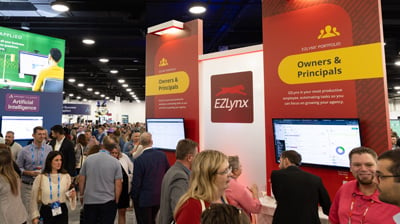Posts
-

Blog
Don’t Leave Success to Luck: Tips on Guaranteeing Insurance Agency Success
-

News & Announcements
Why Applied Net Is Built for EZLynx Users
-

Blog
Customer Retention: Insurance Agency Best Practices
-

Blog
Looking Ahead in 2022
-

Blog
How to Put EZLynx Connect to Work for Your Agency
-

Blog
Put Carrier eDocs to Work for Your Agency
-

Blog
MSB Residential Pre-Fill and Reconstruction Cost Valuations
-

Blog
Get the Most Out of Your EZLynx Agency Website
-

Blog
How to Grow Your Insurance Agency Using Local SEO
-

Blog
AI Isn’t Coming for Your Job: It's Coming for Your Busywork
-

Blog
EZLynx 2024 Year in Review
-

Blog
Mastering Change Management for Insurance Agencies
-

News & Announcements
Accelerating EZLynx Value: EZLynx 2024 Roadmap
-

Blog
Drive More Traffic to your Customer Portal with Direct Bill Payments
-

Blog
What’s New in EZLynx 21.2
-

Blog
What’s New in EZLynx 21.1
-

Blog
What’s New in EZLynx 21.0
-

Blog
EZLynx Expands Carrier Messaging to Include eDocs
-

Blog
New Administrator Privileges Available in EZLynx Reporting
-

Blog
What You Don’t Know CAN Hurt You: 3 Steps to Growing Your Agency with Analytics
-

Blog
4 Reasons Why Customer Portals are Essential for Agencies
-

Blog
Small Commercial Rating Integrations Done Right
-

Blog
Digital Marketing: How Your Agency can Win the Game
-

Blog
The Benefits of AI for Insurance Agencies
-

Guide
Insurance CRM vs Insurance Agency Management System (AMS)
-

Blog
Maximize Commercial Lines Profits – The Insurance Agent’s How-To
-

Blog
Why CRM Should Be Part of Your AMS
-

Blog
2025 Insurance Agency Technology Trends
-

Blog
What Is an Agency Management System?
-

Blog
WEBCETERA Introduces New Marketplace for Carriers and Vendors
-

Blog
Agencies and the Art of Upselling: “Do You Want Fries With That?”, Part 2
-

Blog
Easily Send Birthday Emails with EZLynx Marketing Campaigns
-

Blog
Enhanced Certificate Workflow in EZLynx Management System
-

Blog
Important Announcement about ACORD Forms
-

Blog
What’s New in EZLynx 20.0
-

Blog
What’s New in EZLynx 21.3
-

Blog
Our Strategy with EZLynx Connect
-

Blog
How SMART Goals Fuel Growth for Insurance Agents
-

Blog
How Customer Portals Can Help Your Agency Stand Out
-

Blog
How Automation Enhances Customer Service
-

Blog
Llegar a más consumidores online con la versión en Español de EZLynx Consumer Quoting
-

Blog
Get Quick Access to your Data with EZLynx Mobile
-

Blog
The New Must: Online Customer Self-Service
-

Blog
The E&O Risks with Non-Downloading Carriers
-

Blog
Introducing EZLynx Retention Center
-

Blog
The Stevie Awards: 4 Wins for EZLynx
-

Blog
7 Tips for Increasing Insurance Agent Productivity
-

Blog
Start Your Agency’s Digital Payments Journey
-

Blog
What Is Client Retention Software?
-

Blog
EZLynx Sales Center: Your Insurance Agency CRM Platform
-

Blog
The Modern Insurance AMS: Essential Features for Growth
-

Blog
Sales Best Practices for Insurance Agencies
-

Blog
Accelerating Agency Productivity in 2025
-

Blog
How to Get the Most Out of Your Client Portal
-

Blog
5 Reasons Why Summer is the Perfect Time for Tech Transformation
-

Blog
Entering the Digital Growth Era of Insurance
-

Blog
Automated Renewal Quoting
-

Blog
Automation Software: Discover the Benefits for Insurance Agents
-

Blog
How Agents Should Observe National Car Insurance Day
-

Blog
Summer Marketing Tips for Independent Insurance Agents
-

Blog
Why Insurance Agencies Switch to an All-In-One Management System
-

Blog
Digital Marketing Strategy Best Practices for Insurance Agencies
-

Blog
New EZLynx AI Features
-

Blog
What Is a Client Portal?
-

Blog
The Benefits of Diversifying Your Book of Insurance
-

Blog
Digital Marketing Tips for Insurance Agents
-

Blog
How Insurance Agencies Can Increase Client Retention
-

Blog
A Continued Promise for Innovation at EZLynx
-

Blog
What's New in EZLynx v.22.1?
-

Blog
Without Multi-Factor Authentication, Your Agency Is at Risk
-

Blog
Save Time Processing Endorsements with Automatic Change Request Confirmation
-

Blog
What’s New in EZLynx 20.3
-

Blog
What’s New in EZLynx 20.2
-

Blog
The Importance of Having a Responsive Website
-

Blog
Certificate Self-Generation in EZLynx Client Center
-

Blog
Enhanced Reporting in EZLynx
-

Blog
Data Conversion for EZLynx Management System
-

Blog
Not Sure Yet? Try a Free Trial of Our EZLynx Rating Engine
-

Blog
Core Technology for New Insurance Agencies
-

Blog
20 Best Practices for Marketing Your Insurance Agency
-

Blog
Reach More Consumers Online with Spanish Language version of EZLynx Consumer Quoting
-

Blog
Top 10 Tips for Personal Lines Retention
-

Blog
EZLynx Sales Center: Sales Pipeline Management in EZLynx
-

Blog
What’s New in EZLynx 20.1
-

Blog
Becoming an Independent Insurance Agent: The Benefits of Independence
-

Blog
Millennial Customers: 6 Ways to Attract & Retain this Generation
-

Blog
Building and Maintaining Strong Customer Relationships
-

Blog
New EZLynx Upgrades and Solutions Featured at Applied Net
-

Blog
How to Fix Common Customer Friction Points
-

Blog
Email Marketing Best Practices
-

Blog
How to Exceed Customer Expectations
-

Blog
How to Maximize Customer Retention
-

Blog
Fully Loaded Insurance Websites
-

Blog
EZLynx Marketplace: A new way to add powerful features to your EZLynx account
-

Blog
Frequently Asked Questions About the Applied Systems Acquisition of EZLynx
-

Blog
EZLynx Client Center: Powerful Tools for your Website
-

Blog
What’s New in EZLynx 20.4
-

Blog
Now Available: Send Postal Mail Directly from EZLynx
-

Blog
Branch Support Comes to EZLynx Accounting
-

Blog
Facebook Marketing Tips for Insurance Agents
-

Blog
Salesforce Integration with EZLynx
-

Blog
Import Commission Statements
-

Blog
Introducing the EZLynx ACORD Form Creator
-

Guide
Finding the Best Agency Management System for Your Business
-

Blog
Data: Your Agency's Secret Weapon
-

Blog
Embrace Next-Gen Technology for Agency Success
-

Blog
5 Game-Changing Insurance Customer Service Strategies for 2025: Insights from Our EZGuide
-

Blog
What Is a Comparative Rater?
-

Blog
What Is Insurance Automation Software
-

Blog
A Modern Approach to Personal Lines Proposals
-

Blog
Introducing Quote By Text
-

Blog
What Is CRM in Insurance?